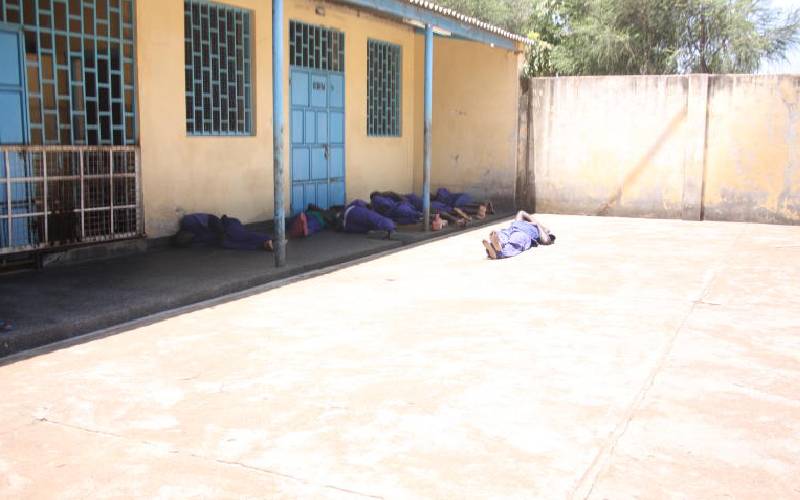
Mental health patients at section of Mathari Hospital, Nairobi. Inset: One of the facility's sinks. [David Njaaga, Standard]
From leaking roofs, buckets used for toilets, to poor or no lighting, Auditor General Edward Ouko painted a grim picture of Mathari Hospital in a report released early this year.
The report, which examined operations at the facility for five financial years covering 2011/12 to 2015/16, also found that although it was grossly underfunded, the facility could not fully account for part of the money it received.
The hospital collects about Sh76.5 million every year for improvement of the facility. In 2015/16 the facility collected Sh91.7 million through a cost-sharing mechanism with patients.
Visible improvement
But the audit saw little to show for the money, noting that there was no “visible improvement” at the facility over the five years. Instead, the report showed a disturbing picture of mental health patients subjected to inhumane conditions.
The audit found mental health patients using toilets without water. At night, the patients used buckets for toilets because there were no toilets inside the wards.
The ward’s roofs had gaping holes and leaked every time it rained.
The hospital suffered drug shortages due to low funding, delayed funding and the long procurement processes at the Ministry of Health.
As a result, patients ended up staying longer at the hospital, causing them more psychological anguish and leading to higher operational costs.
In terms of staffing, the hospital is grappling with an acute shortage of nurses, psychiatrists and psychologists. Staffing levels are way below the World Health Organisation standards, which recommend one psychiatric nurse for every six patients.
At the hospital’s Maximum Security Unit, one nurse attended to 152 patients booked in as law offenders.
The situation has been compounded by the general shortage of psychiatrists countrywide. As at 2015, the country had just 92 psychiatrists, with only 36 working in public hospitals. The country needs 1,533 psychiatrists.
Instead of the requisite 7,666 psychiatric nurses, there were 427, with only 187 working in public hospitals.
According to the report, the shortage of psychiatrists is so bad that one serves about half a million citizens. This has been compounded by the fact that mental health services are not readily available in all levels of health referral system.
Besides Mathari Hospital, mental health services are available in only 29 of the 284 Level Four, Five and Six hospitals countrywide. This has led to congestion at Mathari, largely caused by walk-in patients who would have easily been handled as outpatient cases in other facilities.
Walk-in patients
In the 2014/15 financial year, Mathari had 209 referrals and 47,951 walk-in patients. In 2015/16 there were 466 referrals and 40,551 walk-in patients.
The audit attributed this to the fact that existing psychiatric units in counties lack adequate personnel and other resources. The public also lacks information on the existence of psychiatric units in county hospitals
Ouko recommended that Mathari Hospital be made a semi-autonomous Government agency to enhance the hospital’s capacity to mobilise resources.
He also recommended that the Interior ministry be roped in to see how mentally challenged convicts can be managed in a special facility.
 The Standard Group Plc is a multi-media organization with investments in media
platforms spanning newspaper print
operations, television, radio broadcasting, digital and online services. The
Standard Group is recognized as a
leading multi-media house in Kenya with a key influence in matters of national
and international interest.
The Standard Group Plc is a multi-media organization with investments in media
platforms spanning newspaper print
operations, television, radio broadcasting, digital and online services. The
Standard Group is recognized as a
leading multi-media house in Kenya with a key influence in matters of national
and international interest.











